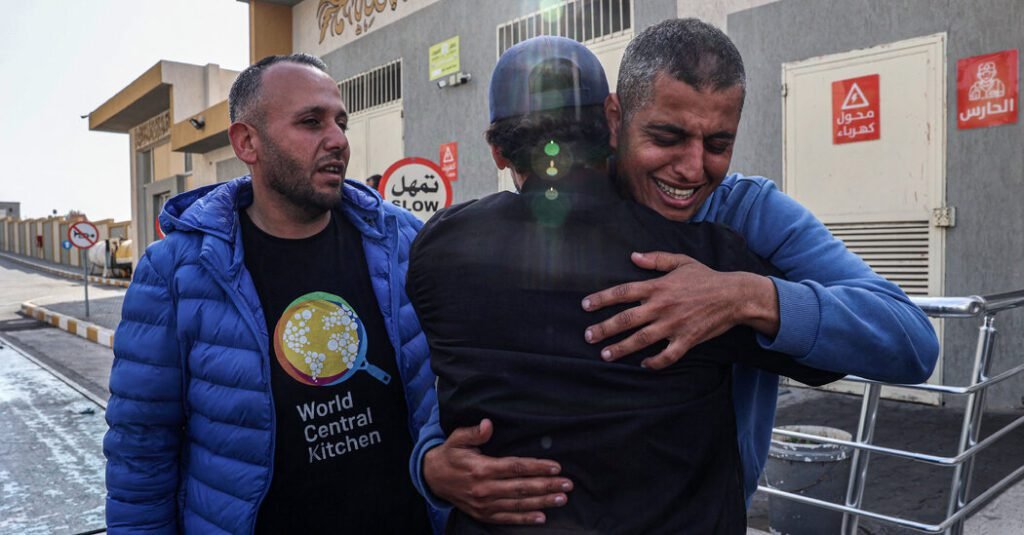To those who knew them, the World Central Kitchen workers killed in an Israeli airstrike in Gaza on Monday were described as dedicated humanitarians who would do anything they could to help those in need.
Six of them came from around the world to help deliver and distribute food throughout the enclave, joining dozens of Gazans already dedicated to the relief work. One was a local Palestinian who was excited to volunteer to help others. They had just left a food warehouse in Deir al-Balah, a city in central Gaza, when an Israeli airstrike hit their convoy, despite the World Central Kitchen coordinating with the Israeli military. All seven of them were killed.
They are the latest victims in the growing number of aid workers killed in Israel’s shelling of Gaza, and are among a dozen workers killed while doing their jobs.
Gaza has been the deadliest place for aid workers since the October 7 attacks. According to the Aid Worker Security Database, a database of attacks sponsored by the United States Agency for International Development, 203 aid workers have been killed in Gaza since the war began. All were Palestinian, except for six of the World Central Kitchen workers killed most recently, who were citizens of Australia, the United States, Canada, Poland and Britain. Since Monday, 176 workers from UNRWA, the UN agency dedicated to the Palestinians, have been killed, according to the organization.
After October 7, 161 aid workers were killed in Gaza in the final weeks of 2023. This total is more than all the deaths of aid workers in the world in any year since 1997, when the aid worker database began collecting data.
Prime Minister Benjamin Netanyahu said on Tuesday that Israel “deeply regrets” the attack on the World Central Kitchen convoy, a rare admission of an attack that killed aid workers, and the Israeli military said it was investigating the incident. Humanitarian personnel are protected by international law.
Saif Abu Taha, the only Palestinian traveling with the convoy, had volunteered at World Central Kitchen since setting up business in Gaza, his older brother Shadi said. At 26, Saif was an enterprising young man who “wanted to do something for others,” his brother said, adding that he worked in their father’s business and spoke good English.
Shadi Abu Taha recalled seeing his brother leave Monday for work with other members of the World Central Kitchen team. The workers “were so excited, like going to a wedding,” he said, intending to go to the wharf in northern Gaza and unload desperately needed food aid.
He never saw his brother again, he said.
Lalzawmi Frankcom, 43, who was known as Zomi, was the Australian worker killed on Monday. She began volunteering for World Central Kitchen in 2018 and was hired the following year, according to her former partner, Josh Phelps.
Their last exchange of messages took place on Sunday, shortly before she and the aid convoy set off from central Gaza. He sent her some photos from their time together delivering food on a reservation in South Dakota. He sent back a heart emoji.
A day later, he discovered that he had been killed.
“Wherever she needed to go, she was willing to go,” he said. “She was following her dreams to make a life around the world.”
Damian Sobol of Poland has been described as “the Michael Jordan of humanitarian work” by a former colleague, Noah Sims, a North Georgia chef who has been on the scene of many World Central Kitchen relief efforts.
They first met while feeding refugees in the south-eastern Polish town of Przemysl, Mr Sobol’s birthplace and where he studied hospitality.
“Anything I ever needed, Damian could do it,” Mr. Sims said.
The BBC named the three British citizens killed in the attack: John Chapman, James Henderson and James Kirby. Local British media described Mr Chapman and Mr Henderson as former Royal Marines who later turned to volunteer work.
The seventh worker was a dual citizen of the United States and Canada, but further information about the identity had not yet been released Tuesday.
Kim Severson and Aaron Boxerman contributed to the report.

